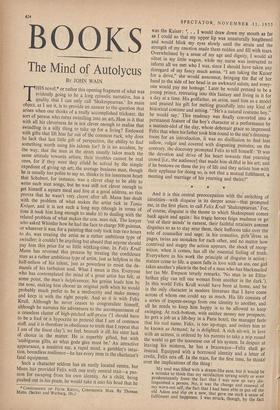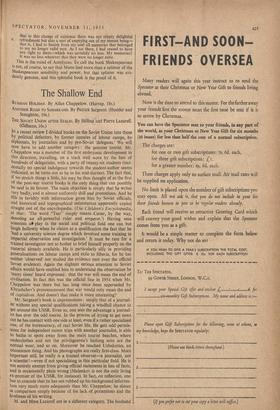BOOKS
The Mind of Autolycus
BY JOHN WAIN THIS novel,* or rather this opening fragment of what was evidently going to be a long episodic narrative, has a quality that I can only call 'Shakespearean.' Its main object, as I see it. is to provide an answer to the question that arises when one thinks of a really accomplished trickster, the sort of person who turns swindling into an art,. How is it that with all his cleverness he is not clever enough to realise that swindling is a silly thing to take up for a living? Endowed with gifts that lift him far out of the common ruck, why does he lack that last little gift of perspective, the ability to find something worth using his talents for? It is no accident, by the way, that the man in the street usually takes much the same attitude towards artists; their troubles cannot be real ones, for if they were they could be solved by the simple expedient of giving up art; the average business man, though he is usually too polite to say so, thinks in his innermost heart that Schubert, for instance, was a clever chap to be able to write such nice songs, but he was still not clever enough to get himself a square meal and live at a good address, so this proves that he wasn't very clever after all. Mann has dealt with the problem of what makes the artist tick in Tonio Kroger, and it is not such a long step (though in terms of time it took him long enough to make it) to dealing with the related problem of what makes the con. man tick. The lawyer who asked Whistler how he had the face to charge 500 guineas, or whatever it was, for a painting that only took him two hours to do, was treating the artist as a rather ambitious type of swindler; it couldn't be anything but absurd that anyone should pay him this price for so little working-time. In Felix Krull Mann has reversed this process by treating the confidence man as a rather ambitious type of artist, just as helpless in the half-nelson of his talent, just as powerless to resist the de- mands of his turbulent soul. What I mean is this. Everyone who has contemplated the mind of a great artist has felt, at some point, the man's helplessness; his genius leads him by the nose, making him choose an original path when he would probably much prefer to be a mediocrity and make money and keep in with the right people. And so it is with Felix Kru11. Although he never ceases to congratulate himself, although he narrates his adirentures to the accompaniment of a ceaseless clatter of high-pitched self-praise CI should have to be a fool or a hypocrite to pretend that I am of common stuff, and it is therefore in obedience to truth that I,repeat that I am of the finest clay'), we feel, beneath it all, his utter lack of choice in the matter. He is superbly gifted, but with `ambiguous gifts, as what gods give must be.' An attractive appearance, a sensitive ear, a rapid mind, a gambler's intui- tion, boundless resilience—he has every item in the chlrlatan's fatal equipment.
Such a character seldom has an easily located centre, but Mann has provided Felix with one truly central trait—a pas- sion for escaping from his own identity. As a child, being pushed out in his pram, he would take it into his head that he * CONFESSIONS OF FELIX KRULL, CONFIDENCE MAN. By Thomas Mann. (Seeker and Warburg, 18s.) was the Kaiser: `. . . I would draw down my mouth as far as I could so that my upper lip was unnaturally lengthened and would blink my eyes slowly until the strain and the strength of my emotion made them redden and fill with tears. Overwhelmed by a sense of my age and dignity, I would sit silent in my little wagon, while my nurse was instructed to inform all we met who I was, since I should have taken any disregard of my fancy much amiss. "I am taking the Kaiser for a drive," she would announce, bringing the flat of her hand to the side of her head in an awkward salute, and every- one would pay me homage.' Later he would pretend to be a young prince, retreating into this fantasy and living in it for a day at a time. His godfather, an artist, used him as a model and praised his gift for melting gracefully into any kind of historical costume and setting. "He's a natural costume boy," he would say.' This tendency was finally converted into a permanent feature of the boy's character at a performance by a matinee-idol of the day, whose debonair grace so impressed Felix that when his father took him round to the star's dressing- room for an introduction, it was no disillusion to find him sallow, vulgar and covered with disgusting pustules; on the contrary. the discovery prompted Felix to tell himself : 'it was the devotion and drive of his heart towards that yearning crowd [i.e., the audience] that made him skilful in his art; and if he bestows on them the joy of life and they satiate him with their applause for doing so, is not that a mutual fulfilment, a meeting and marriage of his yearning and theirs?'
And it is this central preoccupation with the switching of identities—with disguise in its deeper sense—that prompted me, in the first place, to call Felix Krull 'Shakespearean.' For, of course, disguise is the theme to which Shakespeare comes back again and again : his tragic heroes feign madness or go" `out of their minds' in earnest, their faithful retainers assume disguises so as to stay near them, their buffoons take over the role of counsellor and sage; in his comedies, girls 'dress as, pages, twins are mistaken for each other, and no matter how contrived and stagey the action appears, the shock of recog- nition, when it comes, has all the essential feeling of truth. Everywhere in his work the principle of disguise is active: statues.come to life, a queen falls in love with an ass, one girl takes another's place in the bed of a man who has blackmailed her (as Mr. Empson tersely remarks, 'No man in an Eliza- bethan play can tell one woman from another in the dark.'). In this world Felix Krull would have been at home, and he is the only character in modern literature that I have come across of whom one could say as much. His life consists of a series of trapeze-swings from one identity to another, and all he needs to keep him happy is to be allowed to keep swinging. At rock-bottom, with neither money nor prospects, he gets a job as a lift-boy in a Paris hotel; the manager feels that his real name, Felix. is too up-stage, and orders him to be known as Armand; he is delighted. A rich nit-wit, in love with an actress, is ordered by his parents to take a trip round the world to get the nonsense out of his system. In despair at leaving his mistress, he has a brainwave--Felix shall go instead. Equipped with a borrowed identity and a letter of credit, Felix sets off. In the train, for the first time, he thinks' over the implications of the thing :
My soul was filled with a dream-like ease, but it would be
a mistake to think that my satisfaction sprang solely or even predominantly from the fact that I was now so very dis- tinguished a person. No, it was the change and renewal of my worn-out self, the fact that 1 had been able to put off the old Adam and slip on a new, that gave me such a sense of fulfilment and happiness. 1 was struck, though, by the fact
that in this change of existence there was not simply delightful refreshment but also a sort of emptying out of my inmost being— that is, I had to banish from my soul all memories that belonged to my no longer valid oast. As I sat there, I had ceased to have any right to them—which was certainly no loss. My memories! It was no loss whatever that they were no longer mine.
This is the mind of Autolycus. To call the book Shakespearean is not, of course, to say that Mann had more than a splinter of the Shakespearean sensibility and power, but that splinter was evi- dently genuine, and this splendid book is the proof of it.



































 Previous page
Previous page